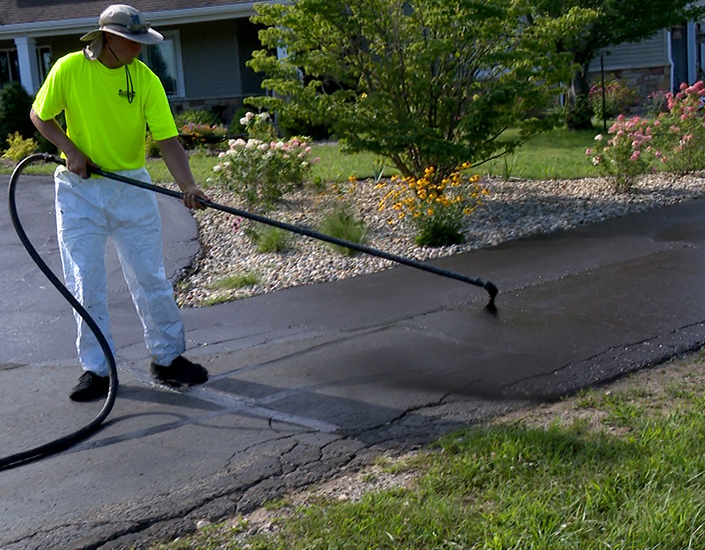Rejuvenate Angle Parking Lots: Asphalt Sealing Approaches Disclosed
Rejuvenate Angle Parking Lots: Asphalt Sealing Approaches Disclosed
Blog Article
Cold Mix Asphalt Vs. Hot Mix Asphalt: Which Is Right for You?

Composition Differences
Cold mix and warm mix asphalts differ dramatically in their composition, with distinct features that impact their performance and applications. Cold mix asphalt is created by emulsifying the asphalt binder with water and an emulsifying agent before blending it with aggregate. This approach allows for the asphalt to be convenient at reduced temperatures, making it ideal for momentary repairs and for use in chillier weather. Hot mix asphalt, on the other hand, is produced at heats, usually in between 300-350 ° F, which helps to achieve much better compaction and a much more durable end product. The warm mix asphalt manufacturing procedure involves heating the aggregate and asphalt binder individually before integrating them at the asphalt plant.
In addition, cool mix asphalt tends to be less dense and more adaptable than hot mix asphalt. This flexibility makes it better suited for areas with higher degrees of activity, such as driveways or roadways with heavy traffic. In contrast, hot mix asphalt is known for its high resilience and resistance to rutting and fracturing, making it a recommended option for freeways and high-traffic roads where durability is crucial.
Installation Refine Differences
The procedure of setting up cold mix and hot mix asphalt exhibits noteworthy variances in their demands and procedures. In contrast, warm mix asphalt necessitates a much more elaborate installment process. Due to the heating demands, warm mix asphalt installments are normally carried out by experts with customized equipment, guaranteeing a more structurally sound and long-term outcome.
Sturdiness and Longevity Elements
When thinking about asphalt options, resilience and longevity are essential factors to evaluate for enduring pavement performance. Hot mix asphalt (HMA) is understood for its exceptional resilience and longevity.
In regards to durability, HMA commonly outshines CMA as a result of its remarkable strength and resistance residential or commercial properties. HMA sidewalks have a longer service life, calling for much less regular repairs and upkeep, which can translate to cost financial savings over time. Additionally, HMA sidewalks are much more easily personalized to satisfy specific job requirements, better boosting their durability.
Price Considerations
Taking into consideration the monetary implications is a critical aspect when reviewing the selection in between warm mix asphalt (HMA) and cold mix asphalt (CMA) for sidewalk tasks. While the preliminary cost of warm mix asphalt is typically more than that of cool mix asphalt, HMA often gives a more affordable remedy over time as a result of its exceptional longevity and longevity. HMA is known for its capacity to endure hefty website traffic loads and severe climate condition, decreasing the demand for frequent repair work and upkeep. On the various other hand, cold mix asphalt is much more inexpensive ahead of time but may require more regular patching and resurfacing, bring about higher maintenance costs in time.
In addition to product expenses, it's essential to take into consideration the expenses connected with setup and upkeep when comparing HMA and CMA. Inevitably, the decision between HMA and CMA must take into account not just the first expense however additionally the long-term monetary implications to figure out the most economical option for the certain sidewalk project.
Environmental Impact Contrast
Contrast of the ecological influences between hot mix asphalt (HMA) and cold navigate to these guys mix asphalt (CMA) reveals distinct distinctions in sustainability practices. HMA production calls for high temperatures, leading to raised energy consumption and greenhouse gas emissions.
Moreover, the usage of CMA frequently involves recycling her latest blog existing asphalt sidewalk, advertising source conservation and lowering the quantity of waste sent out to land fills. This recycling aspect better improves the sustainability of CMA compared to HMA. In general, when thinking about the ecological impact, CMA becomes a much more ecologically lasting option due to its reduced power demands, decreased emissions, and the capacity for recycling existing products. By selecting CMA over HMA, road construction jobs can contribute favorably to ecological preservation efforts.
Verdict
In final thought, the choice in between cold mix asphalt (CMA) and hot mix asphalt (HMA) depends upon various variables such as composition, installation procedure, toughness, longevity, expense, and ecological influence. asphalt patch repair. While CMA uses a cost-effective and quick service for minor repairs, HMA guarantees superior resilience and durability for heavy traffic locations. Take into consideration these aspects very carefully to figure out which sort of asphalt is the best selection for your paving needs

Thinking about the monetary ramifications is a critical element when evaluating the selection in between warm mix asphalt (HMA) and cool mix asphalt (CMA) for sidewalk jobs. While the preliminary i thought about this expense of hot mix asphalt is commonly greater than that of cold mix asphalt, HMA frequently gives a more cost-efficient remedy in the lengthy run due to its superior durability and durability. asphalt patch repair.Comparison of the ecological influences in between warm mix asphalt (HMA) and cold mix asphalt (CMA) reveals distinctive differences in sustainability techniques.In conclusion, the option in between cold mix asphalt (CMA) and warm mix asphalt (HMA) depends on various elements such as composition, installation procedure, sturdiness, longevity, price, and ecological influence
Report this page